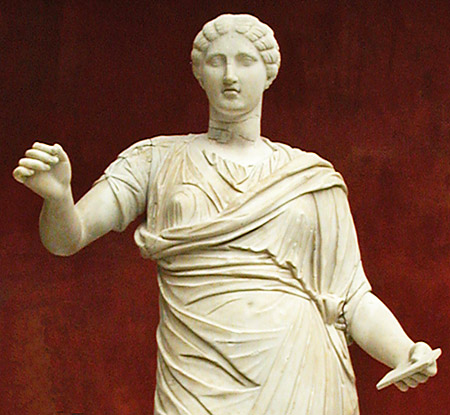 Roman statue of Melpomene (?)
Roman statue of Melpomene (?)
 Roman statue of Melpomene (?)
Roman statue of Melpomene (?)
Were it not for Pliny's letter (c. 101-103 CE), Corellia Hispulla's identity would have gone unrecorded. Her mother was named Hispulla (see women's names); her father was Corellius Rufus (c. 30-97 CE), a consul suffectus in 78 CE, distinguished friend and mentor of Pliny (see Ep. 1.12; also, in Ep. 4.17 Pliny refers to Corelli filia as needing his advice in 105 CE to defend herself in a lawsuit). As many a successful father had done before him (see Hortensia), Corellius doubtless had his daughter educated beyond the traditional minimum for girls, if only to make her more interesting to a politically ambitious suitor or to prepare her to raise sons for public service. During the Empire, girls of Hispulla's class would have acquired more than domestic skills (see Saturninus' wife); some, encouraged by their husbands, would have continued their studies after marriage (see Calpurnia, Pliny's wife). It is unclear which of the two Neratius brothers from Saepinum Hispulla married, Lucius Priscus or Lucius Marcellus; they both served as consul suffectus at different times. She bore a son, Lucius Neratius Corellius Pansa, consul ordinarius in 122 CE, who achieved the career for which his mother so carefully planned. Whether it was culturally expected that the early 2nd century CE materfamilias would arrange her adolescent son's rhetorical education, Pliny writes to her as though she had sole responsibility for this decision. He addresses his remarks to a woman he considered intelligent, rational and moral, who was sympathetic to the suggestion that her son's education include the development of character as well as the techniques needed to succeed before the rostra and in politics. Hispulla continues the tradition of educated elite motherhood set much earlier by women who raised great sons, such as Cornelia, the mother of the Gracchi, Aurelia, Caesar's mother, and Atia, Augustus's mother. In seeking or accepting Pliny's counsel, Hispulla showed her political astuteness, for with this exchange she forged a relationship for her son with a noble statesman and imperial favorite. For more information on Hispulla and the education of women, see Carlon, Pliny's Women, Dixon, The Roman Mother, Hemelrijk, Matrona Docta.
(1)Cum patrem tuum, gravissimum et sanctissimum virum, suspexerim magis an amaverim dubitem, teque et in memoriam eius et in honorem tuum unice diligam, cupiam necesse est atque etiam quantum in me fuerit enitar, ut filius tuus avo similis exsistat; equidem malo materno, quamquam illi paternus etiam clarus spectatusque contigerit, pater quoque et patruus inlustri laude conspicui.
(2)Quibus omnibus ita demum similis adolescet, si imbutus honestis artibus fuerit, quas plurimum refert a quo potissimum accipiat.
(3)Adhuc illum pueritiae ratio intra contubernium tuum tenuit, praeceptores domi habuit, ubi est erroribus modica vel etiam nulla materia. Iam studia eius extra limen proferenda sunt, iam circumspiciendus rhetor Latinus, cuius scholae severitas, pudor, in primis castitas constet.
(4)Adest enim adulescenti nostro cum ceteris naturae fortunaeque dotibus eximia corporis pulchritudo, cui in hoc lubrico aetatis non praeceptor modo sed custos etiam rectorque quaerendus est.
(5)Videor ergo demonstrare tibi posse Iulium Genitorem. Amatur a me; iudicio tamen meo non obstat caritas hominis, quae ex iudicio nata est. Vir est emendatus et gravis, paulo etiam horridior et durior ut in hac licentia temporum.
(6)Quantum eloquentia valeat pluribus credere potes, nam dicendi facultas aperta et exposita statim cernitur; vita hominum altos recessus magnasque latebras habet, cuius pro Genitore me sponsorem accipe. Nihil ex hoc viro filius tuus audiet nisi profuturum, nihil discet quod nescisse rectius fuerit, nec minus saepe ab illo quam a te meque admonebitur: quibus imaginibus oneretur, quae nomina et quanta sustineat.
(7)Proinde, faventibus dis, trade eum praeceptori, a quo mores primum mox eloquentiam discat quae male sine moribus discitur. Vale.
Click on the underlined words for translation aids and commentary, which will appear in a small window.